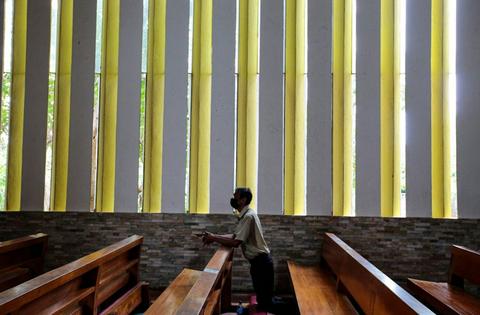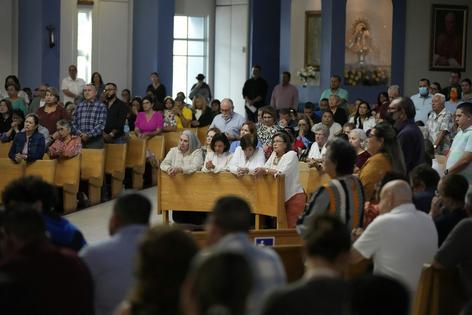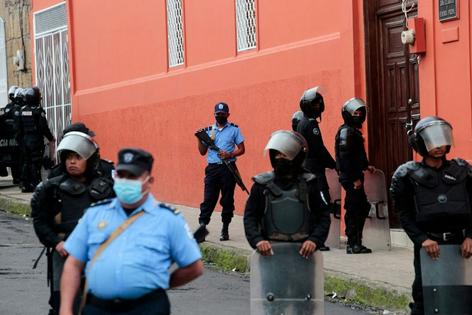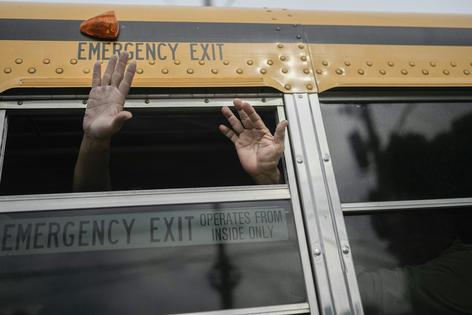Continuing crackdown on churches and NGOs moves Nicaragua further from democracy to authoritarianism
Published in News & Features
The Nicaraguan government recently shut down more than 1,500 nonprofits – many of them civic and religious groups doing humanitarian work in a country long mired in political violence, economic upheaval and social strife.
The August 2024 closures were the latest in a long-running crackdown on civil society, including religious groups – some of the last influential, independent organizations in the country. That same month, the government revoked churches’ tax-exempt status. Over the past few years, many houses of worship have been closed or had their bank accounts frozen.
As a sociologist, I have worked with Central American scholars to research the role of religion in public life in Central America, including Nicaragua. Several hundred Catholic figures have been detained in an ongoing crackdown under President Daniel Ortega, now 78, who leads the Sandinista National Liberation Front.
Ortega’s FSLN party, as it is known in Spanish, is the authoritarian remnant of the group that led a broad national movement against Anastasio Somoza Debayle’s dictatorship in the 1970s. After overthrowing Somoza in 1979, Ortega and the Sandinistas governed until losing the 1990 election.
Since Ortega returned to power in the 2006 elections, moderates have fled the FSLN, which since then has used oppression and violence for political and social control. In 2013, the National Assembly removed presidential term limits set by the Nicaraguan constitution.
In April 2018, Ortega’s regime began targeting student protesters. Since then, hundreds of citizens — religious leaders, university students, academics, journalists and doctors — have been killed or arrested, gone into hiding or been forced to flee the country.
Ortega’s crackdown has been broad. Universities had their assets confiscated and funding cut, and some have been shut down as the government took control of higher education. Media outlets have been shuttered, and international aid organizations have been expelled.
Paramilitary police officers and prison guards have been accused of engaging in arbitrary killings and torture. Meanwhile, a record number of refugees are fleeing the country.
Among the nearly 5,500 nonprofits that closed in Nicaragua between 2018 and 2024 are Catholic, evangelical Christian and historical Protestant organizations, as well as secular humanitarian ones. Of those, 1,650 organizations and churches were shuttered in August 2024, with government officials claiming their closure was due to ties to private enterprises or a lack of financial records.
Catholic media and radio stations, missionary orders and humanitarian groups have been shuttered, too, as Ortega and the vice president – his wife, Rosario Murillo – have sought to eliminate settings where ideas and information freely flow, and people act independently of the government.
The highest-profile religious leader caught up in the clampdown is Rolando Álvarez, a popular bishop, critic of Ortega, and a prominent Catholic voice of protest. Álvarez was detained in August 2022, accused of “conspiracy and spreading false news,” stripped of his citizenship and sentenced to 26 years in prison.
With international pressure mounting, Alvarez and a group of fellow detained Catholic clergy were released in January 2024 and exiled to the Vatican – where the regime had previously expelled the apostolic nuncio, the pope’s top diplomat in Nicaragua. They are among 245 Catholic figures the country has expelled in recent years. An additional 135 people, including Catholics and evangelicals, were expelled and stripped of their citizenship in September 2024.
Today, 43% of Nicaraguan citizens identity as Catholics. But that percentage used to be much higher, and the country has deep cultural roots in Catholicism.
In Nicaragua, as in much of Latin America, the Catholic Church is the most powerful source of social authority and the largest independent institution for public debate. It represents a key channel through which democratic values may take root, grow and thrive – an obstacle, in the regime’s eyes.
For many years, the church was the only organization to escape Ortega’s grip – but no longer.
I have witnessed firsthand Nicaragua’s shift from a country with promising seeds of democracy to violent autocracy. As civil war raged between the original Sandinista regime and U.S.-backed Contras in the 1980s, I led travel seminars to Nicaragua for faith groups, journalists, congressional aides and university students. I once personally encountered Ortega, serving as translator during a meeting with American journalists when his official translator failed to show up.
Today, as Ortega continues to consolidate power by crushing opposition, Nicaragua has deteriorated into an oppressive state ruled with an iron fist. This reality reflects broader dynamics globally, from autocratic movements in the U.S. and Western Europe to current regimes in Russia, India, Turkey, Hungary and China.
Closer to home, Ortega poses a regional threat as a model for other potential autocrats. This is especially the case for neighbors like El Salvador, where President Nayib Bukele – the popular, self-described “coolest dictator” – is going down a similar path of turning the nation into an authoritarian state.
I have seen Nicaraguans’ generosity and courage in the long fight for liberty and justice. The closure of democratic spaces, civic institutions and humanitarian organizations, along with the suppression of religious freedom, is a glaring sign that the country is being marched toward more oppression and violence – and, as history shows, risks becoming ripe for revolution.
Only a gradual rebuilding of civil society, I believe, may save Nicaragua from that fate. The tragedy is what Nicaragua could have been: a thriving democratic society, with a commitment to empowering the poor.
This article is republished from The Conversation, a nonprofit, independent news organization bringing you facts and trustworthy analysis to help you make sense of our complex world. It was written by: Richard Wood, USC Dornsife College of Letters, Arts and Sciences
Read more:
Fujimori’s death won’t end pursuit of justice for Peruvian victims – or stop the strongman’s supporters from revering his legacy
Nicaragua has kicked out hundreds of NGOs – even cracking down on Catholic groups like nuns from Mother Teresa’s order
In the face of severe challenges, democracy is under stress – but still supported – across Latin America and the Caribbean
From 1983-1987 and part-time from 1987-1992, Richard Wood worked running travel seminars in Mexico and Central America. From 2010-2012, he received funding from the Center on Religion and Civic Culture at the University of Southern California and The John Templeton Foundation for research collaboration with Central American researchers.















Comments